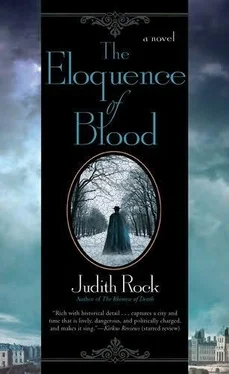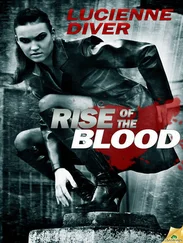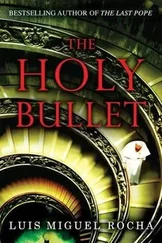Judith Rock - The Eloquence of Blood
Здесь есть возможность читать онлайн «Judith Rock - The Eloquence of Blood» весь текст электронной книги совершенно бесплатно (целиком полную версию без сокращений). В некоторых случаях можно слушать аудио, скачать через торрент в формате fb2 и присутствует краткое содержание. Жанр: Исторический детектив, на английском языке. Описание произведения, (предисловие) а так же отзывы посетителей доступны на портале библиотеки ЛибКат.
- Название:The Eloquence of Blood
- Автор:
- Жанр:
- Год:неизвестен
- ISBN:нет данных
- Рейтинг книги:5 / 5. Голосов: 1
-
Избранное:Добавить в избранное
- Отзывы:
-
Ваша оценка:
- 100
- 1
- 2
- 3
- 4
- 5
The Eloquence of Blood: краткое содержание, описание и аннотация
Предлагаем к чтению аннотацию, описание, краткое содержание или предисловие (зависит от того, что написал сам автор книги «The Eloquence of Blood»). Если вы не нашли необходимую информацию о книге — напишите в комментариях, мы постараемся отыскать её.
The Eloquence of Blood — читать онлайн бесплатно полную книгу (весь текст) целиком
Ниже представлен текст книги, разбитый по страницам. Система сохранения места последней прочитанной страницы, позволяет с удобством читать онлайн бесплатно книгу «The Eloquence of Blood», без необходимости каждый раз заново искать на чём Вы остановились. Поставьте закладку, и сможете в любой момент перейти на страницу, на которой закончили чтение.
Интервал:
Закладка:
“Yes, mon pere?” she said, not so much unwelcoming as openly puzzled by the Jesuit standing before her with burn holes in his hat and cloak.
“Ma soeur,” Charles began, but his voice died as he watched the man with the basket on his back disappear into a passageway. “What will happen to them?”
Her face softened and she beckoned him inside and shut the door. “They will go to wet nurses.”
“And then?”
“Those who live will be returned to our house in the Faubourg St. Antoine. A few will be adopted. By common people, you understand. Most will be placed as servants and apprentices.”
The terrified and forgotten child in the burning building’s window rose in Charles’s mind, and he nearly bit blood from his tongue to stop himself from demanding the basket and taking the infants with him.
“Ma soeur,” he said, sighing, “I have urgent need of information. About a foundling who came to you as much as twenty years ago. All I know of him is that he was called Tito.”
Her wimple and veil, so white and starched that light bounced off them, made it hard to tell her age. Charles guessed that she might be forty.
“I was not here that long ago.” She smiled sadly. “I entered the order after my husband died.” She paused, thinking. “But yes, there is a sister who was here then. Soeur Mariana, a Spanish woman.”
“Please,” Charles said eagerly, “may I speak with her?”
“No, mon pere. She is old and has been ill.”
His heart sank. “Is she expected to recover?”
“I think so. We are praying for her.”
“If-when-she feels well enough, will you ask her about this boy Tito?”
“This is important?”
“Life and death may depend on it, ma soeur.”
“If she is well enough, I will ask her. Come back in a few days. I am Soeur Madeleine.”
She inclined her head to Charles, who bowed and withdrew. The sky was cloudless now and Charles had to squint against the snow glare as he plodded across the court, trying to pray that Soeur Mariana would recover for her sake, not his.
Chapter 23
The lay brother in the clothing room was not pleased. Charles stood before the clothing counter in his cassock, watching the brother inspect the holes in his cloak. “Another cloak gone.” The brother glared at Charles, demanded his hat, and turned it slowly in his hands. Charles realized that he was counting the singed places, perhaps to charge each one to Charles’s purgatory account as so many extra years of penance. Charles unobtrusively clasped his hands behind his back to hide the tiny cinder burns in his cassock sleeves. As he moved, the brother sniffed the air.
“You smell like a peasant’s fire. That cassock will probably have to be washed. Wool is never the same after washing, you know that. Let me see your shoes.”
Charles held out one cold sodden foot and then the other.
The brother rolled his eyes and sighed. “Take them off. The cassock, too. Behind the curtain there.”
Muttering and shaking his head, he left Charles shivering in shirt and stockings while he searched his stores for replacements. When he came back, he was still muttering.
“Frenchmen are short. Except, of course, you. At least your feet are smallish. Here.”
He thrust a cassock, cloak, and shoes around the curtain. “The cassock hasn’t been worn for I don’t know how long. The smell will air out. Your hat you’ll just have to keep for now,” he added with satisfaction. “I don’t have another one.”
“Thank you, mon frere.” Charles put on the ancient cassock and cincture, which smelled of moth remedies and looked as though they’d been in the clothing store since one of St. Ignatius’s original companions turned them in. The shoes, for a miracle, came close to fitting him. And the cloak was heavier than the one he’d lost at the fire. Clothed again, he walked around the curtain and bowed to the clothing master. “Again, my apologies, mon frere, and my thanks.”
“I trust your confessor will hear how much of my stores you have destroyed.”
“He will, mon frere.”
Charles bowed again and escaped. The bright sunshine was at its early January zenith, striking rainbows from ice crystals and glittering on the snow, but it had no more warmth than a painting of sunshine. Pere Le Picart had received Charles’s report before dinner with some alarm at the firefighting story, and disappointment that what Charles had discovered was not enough to confirm Brion’s claims of innocence. Le Picart had also given Charles permission to return to the Couche when need be. For now, though, Charles had his usual duties to perform. He turned his steps toward the grand salon for the student confraternity’s almsgiving, trying to ignore how little his wet stockings were doing for the comfort of the new shoes. He’d gone to the Capuchins wearing both his pairs of stockings for warmth and had not had the courage to ask anything more of the clothing brother.
Arriving early in the grand salon, he sat down in one of the armchairs to wait for the students. His eyes closed almost immediately and he slept till the jarring of his head falling forward woke him. He stared sleepily at the framed paintings of Jesuits on the grand salon’s walls, and the other paintings and engravings scattered among them. The nonportrait drawings were changed from time to time, and Charles got up to look more closely at one he hadn’t seen before. It was an engraving of a heart-not the familiar symbol of Christ’s Sacred Heart, but a liverish-red anatomical rendering that might have been drawn at an autopsy. It was pierced with a myriad of tiny black swords. Sins, the caption explained, damaging and deforming the heart of the sinner. Which should have made him consider the state of his own sinful heart, but instead made him wonder what the Conde’s heart might look like under its silk wrappings.
“Here they are, maitre,” a tutor said from the street passage door.
The boys distributing the week’s alms for the older pensionnaires’ Congregation of the Ste. Vierge came in. Two carried a hip-high basket of loaves between them, and three others were nearly hidden behind the piles of garments in their arms. The remaining pair of boys brought the walnut table from the grand salon to the antechamber and placed it in front of the double doors.
Charles thanked and dismissed the tutors, helped the boys arrange the loaves and clothing, and gathered them for prayer. Then Armand Beauclaire and Walter Connor pushed open the great doors, the snow in front of them having been cleared aside by lay brothers. To Charles’s surprise, Marin was already standing there. The old man hobbled forward.
“Have you medicine, maitre?” He seemed much more himself than when he’d fled from Charles outside the church of St. Louis.
“Not here. Are you ill, Marin?”
“Not me. My boy Jean. He’s coughing up his guts. Has been for a while, but it’s worse now.”
Charles grimaced in sympathy, remembering the young man’s thinness and harsh cough. “I can ask our infirmarian for something to help him.” Charles called Beauclaire to him. “Monsieur Beauclaire, go to Frere Brunet and ask for the remedy he uses for coughs. As many lozenges as he will give you. Quickly.”
Beauclaire bowed, happily important at being trusted with the errand, and sped away. One of the other boys handed Marin a loaf, and the old man tore off a piece and moved aside, eating while he waited.
People were crowded around the doors now, narrow-eyed against the light. Charles stood back as the students distributed bread and clothes. Filthy hands reached for the round loaves, and pinched faces lightened at their solid weight. Charles smiled with satisfaction at the intensity of the boys’ concentration, the effort they made to be courteous, in spite of the running noses, the breath stench, and the sores. In spite of wariness, and sometimes a little fear, they listened courteously to the grumbling, most of it merely sullen, some of it outright crazed.
Читать дальшеИнтервал:
Закладка:
Похожие книги на «The Eloquence of Blood»
Представляем Вашему вниманию похожие книги на «The Eloquence of Blood» списком для выбора. Мы отобрали схожую по названию и смыслу литературу в надежде предоставить читателям больше вариантов отыскать новые, интересные, ещё непрочитанные произведения.
Обсуждение, отзывы о книге «The Eloquence of Blood» и просто собственные мнения читателей. Оставьте ваши комментарии, напишите, что Вы думаете о произведении, его смысле или главных героях. Укажите что конкретно понравилось, а что нет, и почему Вы так считаете.












